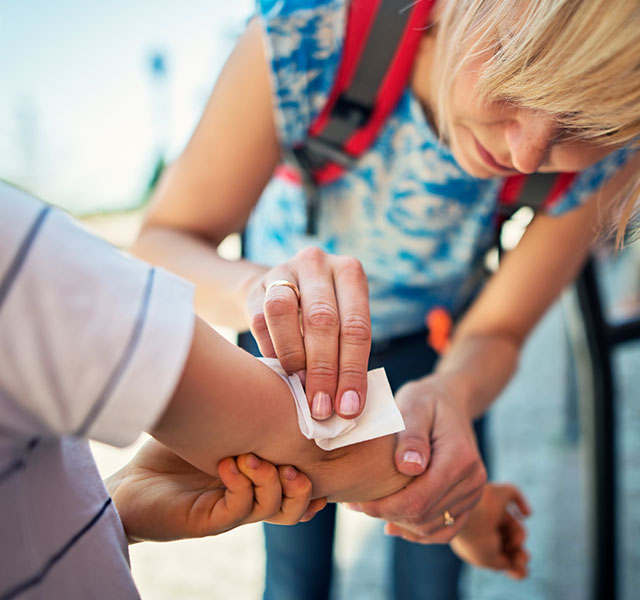Minor cuts and scrapes are an unavoidable part of life—for adults and kids. Whether it’s falling off a bike, stepping on something sharp or slicing your finger during dinner prep, we all get injuries that need attention.
“Most minor cuts can be safely and effectively cared for without a trip to the emergency department,” says Alan Lazzara, M.D., an emergency medicine physician at Henry Ford Health. “But it’s important to recognize red flags that indicate a cut needs medical attention.” It’s also important to keep a first-aid kit on hand to address these types of injuries.
How To Stop A Cut From Bleeding
The first thing you want to focus on is getting the bleeding to stop. “There is usually a gut reaction where you look at the cut and think, ‘Wow, that’s a lot of blood,’” says Dr. Lazzara. But before you rush to the ED, you can try to stop the bleeding on your own.
The best and fastest way to stop a cut from bleeding is to apply—and hold—direct pressure on the wound. “Apply a small amount of gauze or a clean cloth to the cut and hold pressure on it for 10 to 15 minutes to let the blood coagulate,” says Dr. Lazzara. Avoid using large bunches of gauze or cloth. This prevents you from getting direct pressure on the wound. Resist the urge to continually check to see if the bleeding has stopped. When you keep pulling the gauze away to check, blood doesn’t have a chance to clot.
Blood-soaked clothing and spurting or pooling blood indicates an injury to a large blood vessel and requires immediate medical attention. Calling for help and direct, consistent pressure are still your first steps. Applying a tourniquet may be necessary. Dr. Lazzara recommends a simple, one-hour STOP THE BLEED® training to learn how to control severe hemorrhaging with direct pressure.
How To Properly Clean A Cut
Cleaning a cut when it occurs—and keeping it clean until it’s fully healed—is essential for preventing infection. If you cut yourself in a clean environment (with a clean knife, for example), all you need is mild soap and water to rinse the wound. “We don’t recommend using hydrogen peroxide on a wound because it can actually be toxic to the healthy skin surrounding the cut,” says Dr. Lazzara. Alcohol can do the same—plus it will sting on an open cut.
Once the wound is clean, you can apply a thin layer of antibacterial cream or ointment and a bandage. “Antibacterial ointment isn’t absolutely necessary to prevent infection, but it does provide a barrier that protects the skin and helps keep the bandage from sticking to a healing wound,” says Dr. Lazzara.
For minor cuts and scrapes, he recommends taking the bandage off before bed and letting the cut get a little air. “This allows the cut to form a scab—the body’s own protective bandage,” he says. In the morning, clean the cut again and apply a fresh bandage.
Each day when you change the bandage, pay attention to how the cut is healing and if there are any signs of infection—such as redness, warmth, skin around the cut that’s swollen and hard, or discharge of white, milky pus. If you’re concerned about infection, you should contact your doctor.
Types Of Wounds That Require Extra Care
Even a cut that isn’t too severe may need professional cleaning to help prevent infection. “A wound that’s contaminated needs to be cleaned and washed out, and you might even need a course of oral antibiotics,” says Dr. Lazzara. The types of wounds likely to be contaminated include: animal or human bites, deep puncture wounds (like you’d get from stepping on a nail) or cutting yourself in a contaminated environment (like slicing your foot while swimming in a lake that may contain harmful bacteria).
Age and other medical conditions can impact how well wounds heal and whether or not they require medical attention. “People with diabetes, heart or liver disease, a history of smoking or with bad circulation are at higher risk for infection and difficulty healing,” says Dr. Lazzara. In those situations, wound hygiene—and watching carefully for any signs of infection—is even more important.
To find a physician at Henry Ford, visit henryford.com or call 1-800-436-7936.
Dr. Alan Lazzara is board certified in emergency medicine and cares for patients at Henry Ford Health in Jackson.



